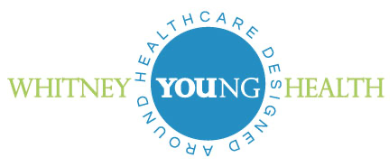Whitney Young Health’s (WYH) namesake, Whitney Moore Young, Jr., has quite a legacy of service. Born on July 31, 1921, he was a civil rights leader who, as head of the National Urban League from 1961 to 1971, spearheaded the drive for equal opportunity for African Americans in U.S. industry and government service.
This year, as a part of National Health Center Week observation, WYH will begin the festivities a week early by observing the birthday of the organization’s namesake, Whitney Moore Young, Jr. Each of the organization’s locations will display posters, balloons, and sweet treats for staff.
After serving in the U.S. Army during World War II, Young switched his career interest from medicine to social work. He earned an M.A. in social work from the University of Minnesota in 1947. He was director of industrial relations for the Urban League chapter in St. Paul, Minnesota, from 1947 to 1950, and from 1950 to 1954 he was executive secretary of the organization’s chapter in Omaha, Nebraska. Young became dean of Atlanta University’s School of Social Work in 1954, and he was instrumental in improving relations between the city of Atlanta and the university.
Young was one of the Civil Rights Movement’s “Big Six” activists. Young, alongside other prominent figures such as Martin Luther King Jr., John Lewis, A Philip Randolph, James Farmer, and Roy Wilkins were the catalysts for change in the United States during the Civil Rights Movement. Young, often referred to as the “Powerbroker” of the Civil Rights Movement, would often participate in meetings with government officials, including United States presidents, to advocate for African Americans and people of color across the country.
Named executive director of the Urban League in 1961, Young became known as an influential Black activist who helped bridge the gap between white political and business leaders and disadvantaged Black Americans and those advocating for their rights. He became one of the major Black leaders of the American civil rights movement. Under his direction, the Urban League grew from 60 to 98 chapters and shifted its focus from middle-class concerns to the needs of the urban poor. He almost single-handedly persuaded corporate America and major foundations to aid the civil rights movement through financial contributions in support of self-help programs for jobs, housing, education, and family rehabilitation.
On March 11, 1971, Young drowned while swimming with friends in Lagos, Nigeria, where he was attending a conference sponsored by the African-American Institute. President Richard Nixon sent a plane to Nigeria to collect Young’s body and traveled to Kentucky to deliver the eulogy at Young’s funeral.
The impact of Young’s commitment to fighting for equal access to employment and healthcare can still be felt today. His work has inspired countless others to pick up the mantle of advocacy and justice for people of color and marginalized communities.
WYH was established in 1971 to provide access to consistent quality healthcare without regard to income. Today, WYH offers primary medical, dental, and behavioral health services to over 20,000 men, women, and children at sites throughout our region.
WYH operates health centers in Albany, Troy, and Watervliet. Our School-Based Health Centers provide medical care in three of the City School District of Albany’s elementary schools and at Albany High School, as well as the Watervliet City School District. Our mobile health unit, Whitney on Wheels, provides medical care at schools, public housing, and community centers in Albany and Rensselaer counties. Through a collaborative dental program with the Healthy Capital District Initiative (HCDI), Seal a Smile delivers preventative dental care at schools throughout our community and has recently added on-site restorative care to over 70 schools.
To learn more about Whitney M. Young, Jr. and his contributions to the Civil Rights Movement, please watch the documentary, ‘The Powerbroker’ on YouTube at the link below.
